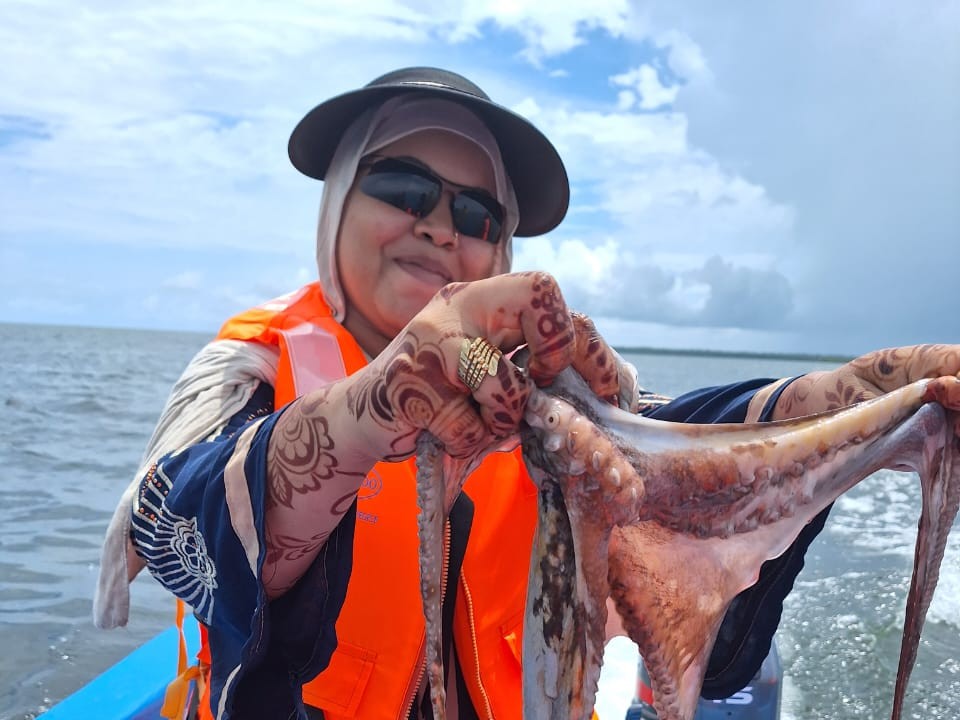As the world commemorated International Women’s Day 2025 on Pate Island in the Lamu archipelago of Kenya’s coast, the theme, Accelerate Action for Gender Equality, resonated with Fatma Athman Mohamed. The 29-year-old has every reason to celebrate. She recently welcomed the birth of her third son, Assif, and her brand-new boat and engine were delivered in the same week.
Fatma owns Fatby Enterprises (pronounced ‘Fatbay’), one of the AECF’s 90 micro-enterprises in the Investing in Women in the Blue Economy in Kenya (IIW-BEK) programme funded by Global Affairs Canada.
“I am a female social entrepreneur,” she says of herself, “empowering women is also good for business.” Before her encounter with the AECF, Fatma had already been aggregating and trading various seafood, including octopus, prawns, lobster, crab, and fish. This involves negotiating the catch from fellow fisherfolk in the deep sea and the creeks demarcating the scenic island of Pate, which is hemmed in from the vastness of the Indian Ocean by thick mangrove forests.
However, one of the biggest business challenges was inefficient transportation for the highly perishable cargo from the jetty at Mtandawanga to Mokowe on the mainland for onward transportation to markets in Malindi and Mombasa.
Typically, renting a boat with a 15-hp capacity engine is daunting for most fishermen, let alone for women like Fatma, who are rolling up their sleeves to challenge deep-seated traditions and stereotypes of what a woman can or cannot do.
“Business here is cut-throat. To survive, you must have good boats, efficient engines, cooler boxes, and a freezer”, Fatma explains. Recalling the hurdles she faced with renting boats and frequent mechanical failures in the past, it was inevitable that these inefficiencies would interfere with her capacity to increase sales and seize market opportunities for her two-year-old business. “During peak harvest time, rarely would you get boats for hire”, she adds.
According to Mohamed Kassim, the chairperson of Pate’s Beach Management Unit (BMU), Pate’s conservative culture is shifting to accommodate women like Fatma, who are determined to break barriers in a male-dominated field.
“The norm was that women were housewives who were not expected to venture away from home, but not anymore,” says Kassim. For instance, his BMU has incorporated six women, with Fatma participating on the executive team as the vice-chairperson of the BMU. “We are giving women a priority in the running of our organization,” adds Kassim, who praises the women for being good role models and mentors in the community.
For Fatma, the encounter with AECF began with an invitation from the county government to attend the launch event for the Investing in Women in the Blue Economy (IIW-BEK) programme. That interaction was the beginning of the formalization of her business. “I did not know much about running a business at the time, but I am glad that I got to register my enterprise formally, and the subsequent mentoring sessions and technical assistance have completely changed my approach to doing business”, she adds She is a stickler for records and professional business processes. At Fatby Enterprises, nothing is left to chance.
On another level, the project has elevated Fatma’s’ profile in Pate and given her business visibility she would never have imagined in the past. “As a boat owner, I am no longer a bystander but a legitimate player in the big league where I am taken seriously”, she laughs. She is grateful to the AECF for holding her hand and the confidence bestowed on her ability to move the business to the next level. “I am constantly streamlining my business operations”, she added.
“Leading a staff of four women, two men, and at least five part-time workers gives me a sense of pride to be an employer and decision-maker”, says Fatma, “it is never far from my mind that together with AECF, we are inspiring more young people to join us in the transformation of our local community”.
However, Fatma is not about to get comfortable and settle down. Along with baby Asif’s expected milestones, Fatma looks forward to increasing her business capacity by installing solar-powered freezers and acquiring additional refrigeration options as he journeys through his infancy. Through its co-creation approach, IIW-BEK allows for knowledge exchange between potential investees and the AECF to leverage expertise in renewable energy and climate change areas. The sessions have allowed beneficiaries like Fatma to develop an understanding of the opportunities available for their businesses while at the same time confronting gender barriers and discriminatory social norms.

